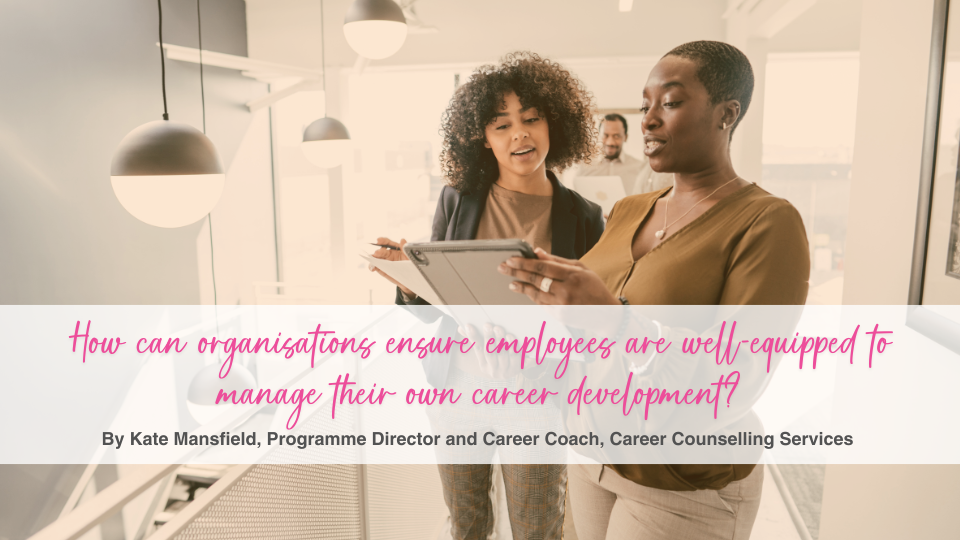
Drop off your CV
We serve the global HR community through our offices located in Delhi, Hong Kong, London, New York, São Paulo and Singapore and have placed HR leaders in over 30 countries.
‘We really want our employees to be pro-active and self-driven in their own career dev...

‘We really want our employees to be pro-active and self-driven in their own career development’.
This is something that we hear very regularly from employers. The flatter structures and constant restructuring that occur within most organisations mean that most employers aspire to have engaged, motivated employees who are able to embrace skills-led career development and manoeuvre nimbly from one opportunity to the other.
The pendulum has well and truly swung from the days of the employer taking responsibility for the individual’s career.
Yet how realistic, or useful is it for employers to expect an individual to take complete responsibility for their own career development? Surely for those individuals who choose to work within organisations there is a shared responsibility that must occur between them and their employer when it comes to career development.
In our work as Career Coaches and Career Specialists, we have noticed that resources and training that enhances career development skills for employees are often met with much positivity initially, with early evaluation indicating that individuals find these sessions incredibly useful. Yet longer-term evaluation of these initiatives often has mixed feedback and results.
Equipping employees to be pro-active and to provide them with the tools and skills to be manage their career development is critical of course. My point is that it is not enough in isolation without considering the environmental factors that help them to develop their careers. We don’t want to risk getting employees excited about career development only to fall at the first hurdle if the organisation does not provide the infrastructure in which they can be pro-active and self-driven Career Managers.
Some employees may be luckier than others. They might have an open and empathic Line Manager, who supports their career development, listens to them and shares valuable resources empowering them to learn, grow and prepare for development. For the less fortunate, they may find that their Manager is a block, reticent to have a career conversation with them. This can be for many reasons; lack of time and skill, or an underlying fear about not being able to provide the answers that they believe their team member wants them to have.
For other employees, there may be challenges around networking across siloed-organisations, frustrations that lateral career development is not recognised in the reward structure of the organisation or there are a lack of inspirational career success stories and role models to tap into.
At CCS, we firmly believe there are ways to marry the needs of individuals and organisations. As Dr Wendy Hirsh suggests in her foreword to our research findings on career strategy (2022), it is only really a ‘half-truth’ that individuals are responsible for their careers.
‘Employers create the jobs we do; they have the power to choose who (sic) to put into those jobs and where to invest in the learning and development that people will need for those jobs’. Dr Wendy Hirsh, Institute of Employment Studies
|
Organisations must find ways to encourage individuals to be proactive within the organisation and develop themselves ‘within’ and ‘across’ rather than necessarily ‘upwards’.
Our Career Strategy Insights (2022) research findings aligned with our experience and broader research in demonstrating that there were significant gaps between the ‘good intentions’ of organisations when it comes to career development and what happens in practice.
Some of the gaps lay in how organisations communicate career conversations, policy, process, and share information and resources. Other gaps were in the skills and confidence of Leaders and Managers to have career discussions.
So what are some of the key ways that Employers can help employees manage their own careers within the organisation?
Create a roadmap that highlights who is responsible for what in terms of career development
We offer Employers a template that allows them to think about the role of employees, managers and the organisation in career development and where the shared, overlapping responsibility sits. It can help to clarify both responsibilities and what exists in the organisational’s infrastructure to support career development.
Provide the employee with the tools and resources through which to have a career conversation
As mentioned, developing good career management skills is essential for employees. Consider offering career development sessions which offer individuals the space in which they can reflect on their skills, strengths, values, motivations and career goals. Offer them a safe space to rehearse what they would like to say in a 1-2-1 career conversation.
Consider the various routes through which an employee can have a career conversation
We have supported many employers with developing the skills amongst different internal communities to have career conversations with employees including internal Career Coaches; Career Mentors or Champions (volunteers who have received training in career conversations) and Line Managers. Through offering a choice of avenues for a career conversation, it is more likely that an individual gains support before it is too late and decides to move on from an organisation.
Simplify learning resources and ensure managers know how to help employees navigate them
Our research indicated that many L&D functions have created a significant amount of career and development related resources but score themselves much lower on the extent to which they are being actively used by employees. Ensuring that the resources are as simple as possible, easy to find and that Managers can signpost them during career conversations is absolutely essential.
Find and share role models and success stories
Careers Weeks are great opportunities to share success stories of career development. It builds momentum and interest around careers and is also an opportunity for you to showcase the career resources available and how to navigate them. Some organisations have set up networks where individuals can borrow time with an individual ‘a human library’ concept to find out specifically about ways in which they developed their career paths.
Review reward mechanisms for development and track data
Finally considering the ways you can track your effort is absolutely critical. What are the organisational goals you hope to support through these initiatives? Consider the ways you can track both linear and lateral career development and if grading systems are getting in the way of encouraging lateral development, is that something that needs to reviewed?
These things don’t happen overnight in my experience but by paying attention to some of these factors provide critical building blocks that ensure that career development is more sustainable and that your employees feel supported with their career development which is a boost to engagement and motivation. Of course it is only natural that some employees will move on regardless, and there must be a health level of attrition in any organisation, but a good foundation for career development is much more likely to keep your key talent for longer periods and provide greater skills mobility.
Kate Mansfield, is a Career Coach and Programme Director at Career Counselling Services. Follow or connect with her on Linked in or email kate@career-counselling-services.co.uk
Career Counselling Services offer career consultancy, career coaching and training in career coaching to organisations, including career conversations skills development programmes for Line Managers. Additionally, they run an open Accredited Career Coach Training programme on a regular basis and Career Coaching Tools Taster Days. Our next Tools Day is on 6th March. Please click for more information and booking.